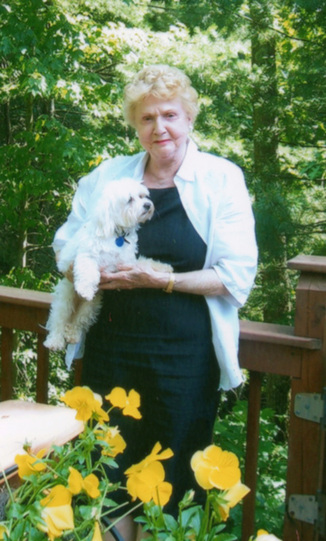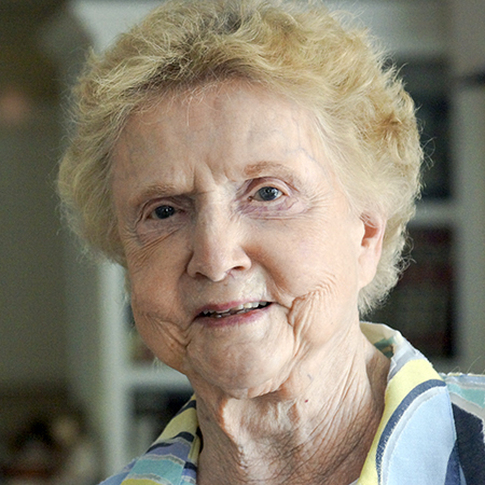Helen Mestayer  Helen and "Stella" in 2007 Helen and "Stella" in 2007 When asked about her age, Helen Hayes Mestayer lifts her chin, looks you in the eye, and says that she doesn’t think of herself in numbers. Quite an outlook. One that has kept Helen Hayes Mestayer going strong through the many decades she’s lived in Bay St. Louis. Helen is so full of vitality that she glows. With animation and enthusiasm, she will keep the listener enraptured with her stories, stories stored up over the 93 years of her life. Born in 1923 in Koscuisko, Mississippi, she grew up among family members who served as lawyers, judges and legislators. Her lawyer grandfather served as a circuit judge; her lawyer father served in the Mississippi legislature “until he just got tired of kissing babies,” Helen states matter-of-factly. The entire family engaged in lively political discussions around the dinner table. Her mother, a college graduate—a feat quite unusual at that time—joined in the discussions with relish. It was during these dinners that Helen educated herself in the art of debate and the finer points of Mississippi politics. Helen bemoans the loss of the practice prevalent when she grew-up of having a family dinner, calling it “ruination…” She also misses the time when front porches abounded. Then, families would sit on the porch to catch an evening breeze and to greet passers-by. Sometimes, friends walking by stopped in for a cold glass of lemonade, or even something stronger. In those days, the choice of whoever chose “something stronger” remained a secret. Helen’s interest in politics and political questions continues to this day. She is prepared to debate current issues like the upcoming 2014 mid-term elections, whether the Republicans will take the Senate, and if so, what effect this may have on the 2016 Presidential race. She “hopes for Hillary” to be the Democrat’s nominee for President. Helen keeps abreast of local races, too, and urges all citizens to vote. “It’s the only way out,” she advises. If Helen wants to know more about local candidates, she does not hesitate to call Camille Tate, an activist citizen of Bay Saint Louis who makes it her business to stay informed about local politicians and local issues important to the community. Like her mother, who had earned a degree from MSCW (Mississippi State College for Women), Helen also pursued a college education. At the age of 18, she attended Milsaps College, in Jackson, Mississippi, majoring in English. A year later, she transferred to the University of Mississippi, in Oxford. Her college years were impacted by the United States’ entry into World War II. Suddenly many Mississippi college campuses were commandeered as dormitories, cafeterias and training grounds for new recruits and volunteers. Helen began working for Delta Airlines after college. She met her future husband, Dick Mestayer, at a Koscuisko wedding where she served as the maid of honor and he, the best man. Richard Frederick Mestayer, Jr., six or seven years older than she, had participated in the bombing of Omaha Beach and had been made a Captain in the U.S armed forces while serving in England. Wearing his uniform in the wedding ceremony, he made a dashing picture, his charm discussed in whispers behind delicate gloved hands. When Delta sent her to New Orleans, in 1945 or ’46, Dick had mustered out and returned to his home, which happened to be New Orleans. Dick got word though a mutual friend that Helen was working in town. He called her and invited her to dinner. And as they say, the rest is history. The couple married on February 14, 1947, though Helen denies that Valentine’s Day had anything to do with it. She declares that the date just happened to be convenient. She is very convincing. Helen and Dick had three children, a son, Richard Frederick Mestayer, III, a daughter, Beth Weidlich, who now lives within shouting distance from Helen’s delightful Bay St. Louis cottage, and her youngest son Allen. Helen and Dick’s move to the Mississippi coast “came by accident,” when she and Dick visited Dick’s father’s summer place in Waveland. They both decided they liked it here, and before long, moved permanently to the coast. Dick, who worked in his father’s lumber business in New Orleans, commuted daily from the Waveland station, leaving at 6:30 a.m and returning about 6:30 that evening. Once Helen was in town, it wasn’t long before she was tapped as a teacher. She and Basil Kennedy’s mother were good friends and at her friend’s insistence, Helen remembers agreeing to teach “temporarily.” She started teaching English at Hancock Central. St. Joseph’s Academy later recruited her to teach, and for four years she taught high school-aged girls the finer points of the English language. Helen had a long career in education, always, it seems, pulled in because she was needed. She helped implement throughout the State, Title I, the federal law that brought money into states to help improve children’s reading skills. She also worked as an administrator charged with implementing reading programs in the Gulfport public school system. When she left the school system, Helen took on the job of teaching adults who had not graduated from high school who wanted to earn a GED. Over the years, she has helped countless Mississippians achieve the goal of bettering their education. She proudly reports that one or two of her students went on to earning a degree from one of the prestigious “Ivy League” institutions, though she is quick to add her strongly-held opinion that educations at Harvard and Yale can be way overrated. Helen admits that she would have enjoyed being an elected official, and working in the public interest. She considered a run for a state-wide post called the Land Commissioner, but upon inspection, decided that the Land Commission itself had out-lived its usefulness and should be abolished. In fact, it was abolished not long after. Not too long ago, Helen was in the hospital for some broken bones. Happily, she has recovered in record time, now able to walk, even without a walker. Prima Luke, (Cleaver Good Neighbor, Oct, 2013), happened to have seen Helen leaving the hospital in a wheelchair. Prima described the scene: “Smiling and waving good-bye to all the friends she had made during her stay, Helen looked just like a Mardi Gras queen, gracefully waving to her subjects as she was wheeled away.” Comments are closed.
|
Categories
All
Archives
July 2024
|
Shoofly Magazine Partners
Our Shoofly Partners are local businesses and organizations who share our mission to enrich community life in Bay St. Louis, Waveland, Diamondhead and Pass Christian. These are limited in number to maximize visibility. Email us now to become a Shoofly Partner!



























 RSS Feed
RSS Feed























